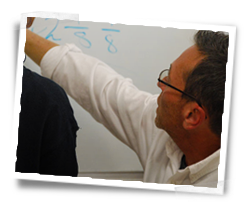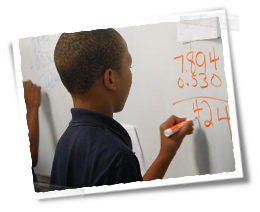


Education researchers are trying to figure out what exactly teachers should know and be able to do in order to teach. "There's been a debate in the field in the last 15 years about whether anybody can be a teacher, [whether] you can walk in off the street, or whether there's actually special content, similar to what you would go to medical school for or law school for," education researcher Heather Hill says. "And that special content is something, that if we can identity what it is, you could teach it to teachers and instruction would improve."
Work that Hill is doing with Deborah Loewenberg Ball, dean of the school of education at the University of Michigan, is revealing new insights about the special knowledge required to teach math effectively.
Math teachers need a good foundation in math. That seems obvious enough. But they need to know how to teach what they know to other people too.
"The capacity to see the content from another's perspective and to understand what another person is doing entails mathematical reasoning and skill that are not needed for research mathematics," Ball and Hill wrote in a 2009 paper. In other words, a brilliant mathematician will not necessarily be a good math teacher, and may, in fact, be a terrible one. Teaching depends on what other people are thinking, not just what the instructor is thinking.
Ball and Hill call this "mathematical knowledge for teaching," or MKT. They have developed a test designed to determine if teachers have this knowledge. The test includes tasks that assess how well teachers analyze student errors and provide explanations that are understandable to young learners.
A group of economists recently administered this test to 418 beginning teachers. They also assessed the teachers' cognitive skills, their "smarts." And they gave the teachers personality tests to measure traits like conscientiousness. The economists found that, of all the variables they measured, only MKT was a significant predictor of a teacher's effectiveness in the classroom. Having MKT mattered much more than scoring "smart" on cognitive tests.
Ball and Hill are now studying how teachers learn MKT. A researcher at Stanford is trying to define a similar body of knowledge for English teachers.
























